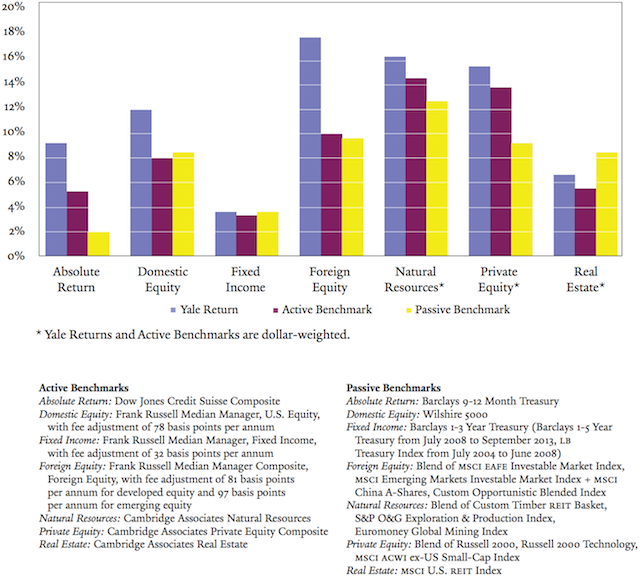Yale University’s $24 billion endowment is holding to its alternatives-heavy strategy despite weak hedge fund performance, according to its latest investment report.
After inflation, CIO David Swensen’s office predicted yearly growth of 6.3% going forward—substantially less than the 10% it has earned annually over the last 10 years.
Unlisted assets—including private equity, natural resources, real estate, and absolute return strategies—accounted for more than three-quarters (76.2%) of its target portfolio, as of June 30, 2014. Domestic equites and fixed income, the mainstays of a traditional institutional fund, together were expected to hold just 11% of the endowment’s assets.
“The heavy allocation to nontraditional asset classes stems from their return potential and diversifying power,” the report stated. “Alternative assets, by their very nature, tend to be less efficiently priced than traditional marketable securities, providing an opportunity to exploit market inefficiencies through active management.”
The roaring US stock market of the last several years has pushed many small endowments ahead of Yale and fellow Ivy League institutions’ investment performance, according to the latest NACUBO-Commonfund report.
Yale has stuck to its strategy, affirming its advantages in unlisted markets as a long-term investor.
Still, a consultant who worked closely with Swensen recently predicted that the Yale model’s best days have past.
The “chances that Yale will be able to reproduce what it has done over the past 25 years over the next 25 years are very small at best, probably a negative number,” Charley Ellis said at NACUBO event last month in New York. “Any institution that decides it will follow the Yale model is probably making a mistake.”
Over the 10 years ending June 30, 2014, the world’s second-largest university endowment earned $8.4 billion above its peer benchmark. Net-of-fees, its performance during that period averaged 11% annually.
Yale Endowment 10-Year Asset Class Returns: 2004-2014
 Source: 2014 Yale Investments Report
Source: 2014 Yale Investments Report
Related Content: US Endowments Lag Public Pension Returns, Again; The Malpass Model
